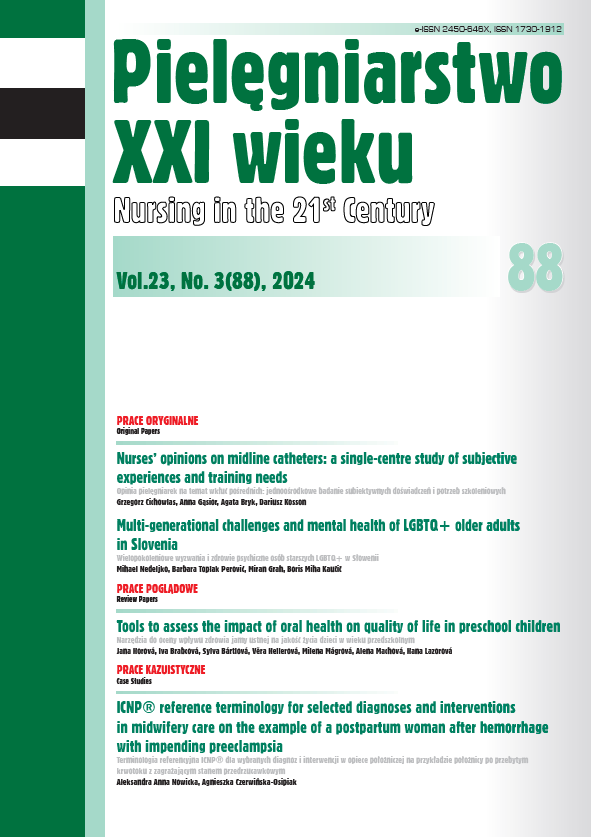Late mental sequelae in post-COVID-19 individuals
DOI:
https://doi.org/10.2478/pielxxiw-2024-0039Keywords:
COVID-19, mental health, quarantine, metacognition, distressAbstract
LATE MENTAL SEQUELAE IN POST-COVID-19 INDIVIDUALS
Aim. The aim of the study was to investigate the long-term psychological eff ects in patients who had experienced COVID-19 and those who underwent quarantine. Diff erences in metacognitive beliefs and overall mental health were analyzed to assess their impact on the emergence of psychological distress.
Material and methods. The study involved 122 participants, including post-COVID-19 patients and individuals who had been quarantined. To assess mental health, the Metacognitive Questionnaire (MCQ) and the General Health Questionnaire (GHQ-12) were used, providing data on metacognitive beliefs and overall mental health.
Results. Post-COVID-19 patients more frequently reported positive beliefs about worrying (MCQ1), while quarantined individuals scored higher in cognitive self-awareness (MCQ5) and negative beliefs about lack of control over thoughts (MCQ4). Both groups exhibited similar levels of general psychological distress, suggesting that the pandemic had a widespread impact on mental health, regardless of direct contact with the disease.
Conclusions. Both post-COVID-19 patients and quarantined individuals require psychological support to counteract the negative mental eff ects of the pandemic. Therapeutic interventions, such as cognitive-behavioral therapy and mindfulness techniques, can help manage stress and rumination.
References
1. Sudre CH, Murray B, Varsavsky T, et al. Attributes and predictors of long COVID. Nat. Med. 2021;27(4):626-631. https://doi.org/10.1038/s41591-021-01292-y.
2. Mazza MG, De Lorenzo R, Conte C, et al. Anxiety and depression in COVID-19 survivors: Role of inflammatory and clinical predictors. Brain. Behav. Immun. 2020;89:594-600. https://doi.org/10.1016/j.bbi.2020.07.037.
3. Carfi A, Bernabei R, Landi F, et al. Persistent symptoms in patients after acute COVID-19. JAMA. 2020;324(6):603-605. https://doi.org/10.1001/jama.2020.12603.
4. Rogers JP, Watson CJ, Badenoch J, et al. Neurology and neuropsychiatry of COVID-19: a systematic review and meta-analysis of the early literature reveals frequent CNS manifestations and key emerging narratives. J. Neurol. Neurosurg. Psychiatry. 2020;91(10):1169-1176. https://doi.org/10.1136/jnnp-2020-324486.
5. Taquet M, Geddes JR, Husain M, et al. 6-month neurological and psychiatric outcomes in 236 379 survivors of COVID-19: a retrospective cohort study using electronic health records. Lancet Psychiatry. 2021;8(5):416-427. https://doi.org/10.1016/S2215-0366(21)00084-5.
6. Halpin SJ, McIvor C, Whyatt G, et al. Postdischarge symptoms and rehabilitation needs in survivors of COVID-19 infection: A cross-sectional evaluation. J. Med. Virol. 2021;93(2):1013-1022. https://doi.org/10.1002/jmv.26368.
7. Kempuraj D, Selvakumar GP, Ahmed ME, et al. COVID-19, mast cells, cytokine storm, anxiety, and psychological distress: How it can impact mental health and aggravate psychiatric conditions?. Eur. Rev. Med. Pharmacol. Sci. 2020;24(18):9151-9162. https://doi.org/10.26355/eurrev_202009_22935.
8. Tomasoni D, Bai F, Castoldi R, et al. Anxiety and depression symptoms after virological clearance of COVID-19: A cross-sectional study in Milan, Italy. J. Med. Virol. 2021;93(2):1175-1179. https://doi.org/10.1002/jmv.26459.
9. Moreno C, Wykes T, Galderisi S, et al. How mental health care should change as a consequence of the COVID-19 pandemic. Lancet Psychiatry. 2020;7(9):813-824. https://doi.org/10.1016/S2215-0366(20)30307-2.
10. Alonso J, Vilagut G, Mortier P, et al. Mental health impact of the first wave of COVID-19 pandemic on Spanish healthcare workers: A large cross-sectional survey. Rev. Psiquiatr. Salud. Ment. 2021;14(2):90-105. https://doi.org/10.1016/j.rpsm.2020.12.001.
11. Williams P, Merecz D, Goldberg DP, i wsp. Ocena zdrowia psychicznego na podstawie badań kwestionariuszami Davida Goldberga: podręcznik dla użytkowników kwestionariuszy GHQ-12 i GHQ-28. [w:] Instytut Medycyny Pracy im prof dr med Jerzego Nofera (Łódź). Łódź: Oficyna Wydawnicza IMP; 2001, s. 1-112.
12. Benedetti F, et al. Neuroinflammation in COVID-19 patients: A systematic review. J. Neuroinflammation. 2021;18(1):1-17. DOI: 10.1186/s12974-021-02212-8.
13. Ceban F, et al. Fatigue and cognitive impairment in Post-COVID-19 Syndrome: A systematic review and meta-analysis. Brain Behav. Immun. 2022;101:93-135. DOI: 10.1016/j.bbi.2021.12.020.
14. Huang C, et al. 6-month consequences of COVID-19 in patients discharged from hospital: A cohort study. Lancet. 2021;397(10270):220-232. DOI: 10.1016/S0140-6736(20)32656-8.
15. Vindegaard N, Benros ME. COVID-19 pandemic and mental health consequences: Systematic review of the current evidence. Brain Behav. Immun. 2020;89:531-542. DOI: 10.1016/j.bbi.2020.05.048.
16. Guo Q, Zheng Y, Shi J, et al. Immediate psychological distress in quarantined patients with COVID-19 and its association with peripheral inflammation: A mixed-method study. Brain Behav. Immun. 2020;88:17-27. https://doi.org/10.1016/j.bbi.2020.05.038.
17. Brooks SK, et al. The psychological impact of quarantine and how to reduce it: Rapid review of the evidence. Lancet. 2020;395(10227):912-920. DOI: 10.1016/S0140-6736(20)30460-8.
18. Shevlin M, et al. Anxiety, depression, traumatic stress and COVID-19-related anxiety in the UK general population during the COVID-19 pandemic. BJPsych. Open. 2020;6(6). DOI: 10.1192/bjo.2020.109.
19. Morin CM, et al. Persistent insomnia and cognitive impairment in COVID-19 survivors: A 6-month follow-up study. J. Clin. Sleep. Med. 2021;17(6):1141-1150. DOI: 10.5664/jcsm.9196.
Downloads
Published
Issue
Section
License
Copyright (c) 2024 Authors

This work is licensed under a Creative Commons Attribution 4.0 International License.




